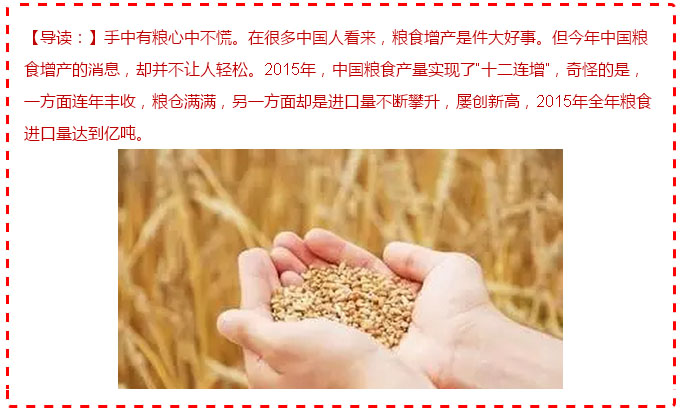The Four Big Food Merchants'Mysteries of Food Price "The Hand Behind the Back" Surface

Domestic grain stocks and foreign grain stocks
The reason for China's large-scale import of foreign grain is not the insufficient domestic supply. On the contrary, the grain depots are full of domestic grain, while the imported grain can be sold and circulated in the market.
"The increase in imports is not due to insufficient food, but mainly to the huge price gap between domestic and foreign grain." Chen Xiwen, deputy head of the Central Rural Work Leading Group and head of the office, gave an astonishing number. He said that for the main varieties of rice, wheat and maize, the market price of domestic grain is about 30% to 50% higher than that of the international market.
Data show that in the first half of 2015, the prices of rice, wheat, corn and other staple grains exceeded 50% of the international market. The import customs value of grain, cotton, oil, sugar and other staple agricultural products was about 1000 yuan lower than that of domestic products, which led to the increasing imports of grain, cotton, oil and sugar.
The continuous surge in imports can easily lead to two negative consequences: one is the serious backlog of stocks; the other is the impact on the domestic grain market, resulting in a sharp drop in domestic grain prices and hurting farmers. If allowed to develop, farmers'enthusiasm to grow grain and national food security will be deeply affected.
Who has the right to price grain
If it hadn't been for the 2008 global food crisis, the four most understated international grain merchants would have continued to expand silently. But now, with the four major grain merchants being made public, their global industrial chain has gradually emerged.
The four major international grain merchants are ADM, Bunge, Cargill and Louis Dreyfus. According to the initials of their English names, they are abbreviated as ABCD. The four major grain merchants are all multinational grain merchants with a history of more than 100 years. At present, 80% of the world's grain trade volume is monopolized in the hands of the four major grain merchants. "Only they can fix prices."
At present, nine of the world's top 10 grain exporters are the four major grain producers. From seed, feed and fertilizer to production, supply and marketing, they have absolute advantages in almost every level of the market.
Sad songs of soybean in China
The lesson of soybean market is the most painful when China's food discourse falls. Soybean originated in China. At one time, China produced more soybean than the rest of the world combined.
In 2001, when China opened its soybean market to the outside world, foreign-funded enterprises continued to pour into China, and multinational giants began to dominate China's soybean industry. In 2004, China's small and medium-sized soybean processing enterprises and local oil-extracting enterprises were unable to bear the load after being subjected to the crazy crackdown of international investment funds. They declared bankruptcy one after another and were annexed by foreign capital at a low price. After the 2004 soybean crisis in China, ADM, Bangji, Cargill and Louis Dafu, the four major transnational grain dealers, successfully controlled 85% of the actual processing capacity of soybeans. Multinational grain dealers are also stepping up their control of rice and Maize in China.
At present, China has become the world's largest soybean importer, with annual imports reaching 1/3 of the total global imports. According to the General Administration of Customs, annual soybean imports reached a record 81.69 million tons, an increase of 14.4% over the previous year.
Endangering the three main staple foods
The fall of soybeans has become a fact, and the three major staple grains of rice, wheat and maize have slowly fallen into the good situation of foreign distribution. As early as ten years ago, foreign capital began to lay out the whole rice industry chain in Northeast China, from seeds, planting, storage to processing, without any omission.
It is understood that foreign-funded enterprises have approved 84 Maize Varieties in China. Although the market share of foreign-funded maize varieties is relatively small, in recent years, some foreign-funded maize varieties have been promoted rapidly in China. Monsanto Corporation of the United States has planted more than 10 million mu of corn in Guangxi, which is equivalent to one fifth of the planting area in Heilongjiang Province, a major corn province. For the first time in 14 years, Cofco has imported GM maize on a large scale. Industry insiders are worried that China's maize industry may be controlled by foreign capital. Corn is the main raw material in aquaculture industry. Once it is controlled by foreign capital, China's aquaculture industry will be subject to foreign investment, and the prices of pigs, chickens and duck may also depend on the face of foreign capital.
Local government support?
With the expanding scale of foreign businesses'strategy of seizing cities, the foreign capital's market-grabbing behavior becomes more and more covert. Unfortunately, when foreign capital purchased state-owned grain depots in major grain-producing areas of China and laid out the tactics of the whole industrial chain, they received strong support from local governments. In 2008, Yihai Grain and Oil purchased Fujin Jiu Grain Depot of Heilongjiang Province and Suihua No. 4 Grain Depot of Heilongjiang Province at a very low threshold for rice processing and rice husk power generation, as well as large-scale intensive grain processing relying on the abundant local agricultural resources.
According to the survey, foreign grain merchants also declare unrestricted projects such as pressing cottonseed and palm oil processing, which are actually used for soybean, rapeseed or oil processing after the completion of the project; furthermore, with a total investment of less than 50 million US dollars, foreign merchants "turn large investment projects into small ones" and avoid the competent investment department of the State Council. Examination and approval, taking advantage of its global supply chain advantages, using low-price strategy in the domestic market to impact domestic small and medium-sized grain enterprises, forming a trend of rapid expansion.
Since 2004, because of the gradual implementation of market-oriented grain purchase and sale, grass-roots grain depots no longer receive state financial subsidies and are fully responsible for their own profits and losses. This makes the production and operation of some grain depots difficult and heavily indebted. At this time, facing the embroidery ball thrown by the powerful foreign grain merchants, many grass-roots grain depots think that it is a good way to solve the difficulties.
"After the restructuring of the grain system, the survival of grain depots has been relatively difficult. Local grain depots have been short of funds for many years and have no grain storage. Working with them, they can use their funds to bring income to the grain depot." The head of the Grain Bureau of a county in Northeast China said in a previous interview with the media. Some scholars worry that the layout of transnational capital in China's grain market is far from over. Once transnational capital controls rice and maize and other grain, Chinese people will pay a more heavy price for it.
Source: Chinese Civil Commerce

